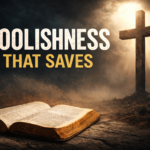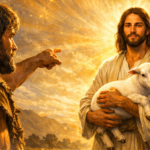“The Basics” – Jude 20-25
1. Jude: An unfamiliar New Testament book
Last Sunday I started by explaining that there are parts of the Old Testament that are quite unfamiliar to us. Today, we have to make that same admission about the book of Jude in the New Testament. Who can even think of one famous verse from the book of Jude? Maybe that’s because it’s only 25 verses long. The majority of those 25 verses are a caution against false teachers, and they are spoken of in reference to several Old Testament stories and characters: the Israelites in Egypt, Sodom and Gomorrah, Moses, Balaam, Enoch, and Adam. Even the archangel, Michael, is identified as contending with the devil. Jude’s appeal through all of this is for his readers to contend for the faith in the face of ungodly people who pervert the truth about God’s grace in Christ Jesus. The last few verses are a call to persevere during the last days when scoffers who do not have the Spirit of God will try to deceive people. Oh, and did you know that early Christian writers claim that the author, Jude, is the son of Mary and Joseph, and a half-brother of Jesus, Himself? That makes this book authoritative and reliable, even though Jude wasn’t one of the twelve apostles.
Sometimes life gets complicated by busy-ness, by details, by appointments, by responsibilities, by the complexities of living in a bustling many-faceted 21st century world. Sometimes, when life gets complicated like that, we can lose sight of the very basic things that we, as Christians, need and thrive on. As we approach the season preparing for Christmas celebrations – a season that just adds to the complexities of life – I want to use the words of the refrain of a 1992 song by a group named “4 Him” to remind you of the very basics for our Christian walk with God. The song was called “Back to the Basics” and it lists four basics that really fit into and can be drawn from our Epistle Reading from Jude 20-25. So, let’s consider these basic things which impact and influence our Christian life as we wait for the return of Christ.
2. A heart that is pure
A verse from Psalm 24 led us into our confession of sins this morning. Psalm 24 has an Advent theme to it, as it talks about the King of Glory, the Lord strong and mighty, coming into the gates and doors of the Holy City. Earlier in the psalm it asked about what person may come to the city and stand in the holy place. The answer was that only that person who has clean hands and a pure heart can approach the holy place and stand in the very presence of the Lord. Who here today can honestly say that you have cleans hands (that is, good and honorable actions) and a pure heart (that is right attitudes and motives)? None of us is by nature clean and honorable and inwardly pure. In fact, sometimes our confession of sins admits exactly the opposite – “that we are by nature sinful and unclean.” We have confessed our sins this morning and our hands and hearts have been affected in a positive way, a grace way. The words that we used from Psalm 51 prayed that God would create a pure heart and a steadfast and solid spirit within us. Only God, through the sacrifice of Jesus on the cross, can make our hearts pure and suitable to come before Him in reverence and humility. This is what Jude 24 says, too: “To Him – that is, to God – who is able to keep you from stumbling and to present you blameless before the presence of His glory with great joy – to [Him]… be glory…” Blameless means pure… pure in heart. God makes us pure in heart, holy, righteous by forgiving our sins for the sake of Jesus, our Saviour. It’s only because of Jesus that we can stand, head up, eyes up, hands clean, hearts pure, before God.
When we know that God has made us pure, one of the basics of life is to live who we are, and what we are… to live pure and holy.
A farmer sold his home made cottage cheese and apple butter at the Farmers’ Market each week. He transported them in two large tubs, from which he ladled the cottage cheese or apple butter into smaller containers the customers brought. One day he got to the market and discovered he had forgotten one ladle. He felt he had no choice but to use the one he had for both products. Before long, after dipping from one tub and then the other, he could no longer tell which was which.
That’s the way it is when our lives, our hearts, get dipped back and forth between the Word and the world. Pretty soon we aren’t sure what’s of God and what’s of the world. Let me give you a couple of examples:
You dip your heart into God’s Word and hear the Commandment “You shall not murder.” You dip your life into the world which calls Medical Assistance in Dying mercy for the terminally suffering. It gets confusing, and you can’t tell what is good and Godly.
You dip your life into the world and buy lottery tickets for some honourable charity. You dip your heart into God’s Word, and hear that the “love of money is the root of all kinds of evils.” So, are you buying that lottery ticket to give to charity or for the hope of a big win? It gets confusing, and you can’t tell where your heart’s motivation is.
Jude’s way of stating this is: “Hate even the garment stained by the flesh / the world.” Keep unstained from the world. Keep the cottage cheese separate from the apple butter. Keep the things of God separate from the world. Keep the things of God pure. Dip into God’s Word regularly. Drink long and hard and deep from its pure truths, and your heart will also become and remain pure.
In the Beatitudes, what did Jesus say of the pure in heart?? “Blessed are the pure in heart for… they will see God.”
3. A love that is blind
Speaking of seeing… the second basic mentioned in the song is “a love that can’t see, a love that is blind.” What does the author of the song mean? Possibly, probably a love that doesn’t discriminate. It doesn’t see or distinguish based on colour of skin, or age, or appearance, or ethnic background, or mental or physical ability, or social standing. A love that is blind doesn’t act one way with one group of people and another way with a different group. It is blind to the personal differences, and just loves without judging who or why. Please note that that love is not blind to the actions of a person. True love does not just turn a blind eye to what another person says or does that is wrong, ungodly, sinful. True love does not indiscriminately forgive without first calling for repentance and reconciliation and a sincere desire to change. But true, God-pleasing love does not discriminate based on outward appearance.
Isn’t that the moral of the parable of the Good Samaritan? The two Jews – religious ones, at that – didn’t help their fellow Jew who had been beaten and robbed and left by the side of the road. It was a foreigner, a despised Samaritan with a love that was blind, who stopped to help the dying Jewish man and nurse him back to health and strength. He didn’t tally up the monetary or emotional cost of helping the man in need. He turned a blind eye to national, ethnic and even spiritual differences and simply did what Jesus said, “Love your neighbour as you love yourself.” Rabbi Ben Julius wrote: “Love is not blind… it sees more, not less. But because it sees more, it is willing to see less.” We can be quite certain that the Samaritan knew what a Jew looked like. He knew this was a Jew at the side of the road, but he was willing to see less of the distinctions, and determined simply that this was a man in need, a man who needed someone else to show love to him. The way Jude put it is “to others show mercy” – mercy being undeserved kindness, or love.
God’s love is like that, too… it is willing to see less, even though it sees more. God is willing to see less of your sins. God looks at your life with something like X-ray vision. He sees right into your life, right through you. He knows your weaknesses, your failures, your past… He knows your sins. He knows you better than you know yourself. But He also loves you so much that He did something about it. He sent His only-begotten Son, Jesus, to suffer and to die on the cross to forgive you all your sins. Because of Jesus, God is willing to look long and hard at your life, but to see less rather than more of your sins. He looks for your sins, but what He sees is Jesus with His purity and holiness and forgiveness.
Peter Miller was a Baptist pastor and friend of George Washington during the American Revolution. Michael Wittman lived in Miller’s town and did all he could to oppose and humiliate the pastor. One day Michael Wittman was arrested for treason and sentenced to die. Peter Miller traveled seventy miles on foot to Philadelphia to plead for the life of the traitor. General Washington, however, announced: “I cannot grant you the life of your friend!”
“My friend?!!” exclaimed the old preacher. “He’s the bitterest enemy I have.”
“What?” cried Washington. “You’ve walked seventy miles to save the life of an enemy? That puts the matter in different light. I’ll grant your pardon.”
And he did. Peter Miller took Michael Wittman back home… no longer an enemy but a friend.
That’s love that is willing to be blind, and to see less. That’s love that just loves… no holds barred. It’s a love that loves God, and then also loves a neighbor – even if that neighbor is an enemy.
4. A faith that is fervently grounded in Christ
The third basic thing in the refrain of that song is “a faith that is fervently grounded in Christ. What Jude says is: “Build yourselves up in your most holy faith.” When you hear the word ‘build’ it’s easy to think of a ‘building’ and Jesus’ famous story of the two men who built their houses on different foundations. The man who built his house on sandy ground saw his home totter and fall when the winds and the rains came. But the man who built his house on the solid foundation of a rock enjoyed the warmth and stability of a home that withstood the elements. Isn’t that what we all needed earlier this week when the atmospheric river poured rain and winds onto our little homes?
I remember as a young pastor going to LaRonge, Saskatchewan for a pastors’ conference. I took a photo of the local church because, I was told, the entire church was built on one rock at the start of the Canadian shield. It beautifully illustrates the point of Jesus’ story. That church wasn’t going anywhere because it was built on a solid foundation.
That parable of Jesus was not primarily referring to construction techniques, but rather on what you build your life. Just like the rock solid foundation for that man’s home, or for that church, we all need a rock solid foundation for our lives – something, someone that will not quiver and shake and totter with the changing of the times, with the floods and storms of life.
That someone is Jesus. Today’s people attempt to build their lives and stake their raison d’etre on various things. Some build their lives on themselves, looking for meaning from within. Others look for guidance from the stars, which is really guidance from someone who professes to interpret the stars. Others follow the teachings of some wise man of a faraway country or a long-ago time. The trouble with all of these foundations for one’s life is that they are based on created things / people. People change, values change, motives change. That makes a human foundation shaky and sandy.
Because Jesus is not a created being but rather of one substance with the creator of all, only He is an unchanging foundation. Hebrews 13 reminds us that “Jesus Christ is the same yesterday, today and forever.”
Our faith is grounded in the teachings of Jesus Christ who knows all the ins and outs of life because He created life in the first place. He knows what makes us tick, and has not only told us how to live in relationship with God and others, but also modeled it. Then, because He knew we wouldn’t and couldn’t live up to those holy standards, He laid down His life on the cross so that we could be forgiven for all our sins. Our faith is grounded in Jesus’ innocent death and the forgiveness that He earned for us by dying in our place. Our faith is likewise grounded in Jesus’ resurrection from the dead – proof that He was indeed God, proof that He is worth building our lives on. We’re going to capture ALL of that in a few minutes in one of our Communion songs – “In Christ Alone Our Hope is Found…”
5. A hope that endures for all time
That leads us to the fourth basic… hope. 4 Him sang about a “hope that endures for all time.” Hope is a funny thing, a future thing. I hope that my car will start when it’s cold outside. I hope that my grandkids will marry a Christian spouse. I hope that my team will win the championship. In each of those cases, the desire is yet unseen, the hope is uncertain, but I am optimistic.
Florence Chadwick waded into the water off Catalina Island on July 4, 1952. She intended to swim the channel from the island to the California coast. She had been the first woman to swim the English Channel in both directions. However, that day the water was numbing cold, and the fog was so thick she could hardly see the boats in her party. Several times sharks had to be driven away with rifle fire. She swam for more than fifteen hours before she asked to be taken out of the water. Her trainer tried to encourage her to swim on since they were so close to land, but when Florence looked all she saw was fog. So she quit… only ½ mile from her goal. It wasn’t the cold or fear, neither the sharks nor the exhaustion that caused Florence Chadwick to fail. It was the fog. It was the fact that she couldn’t see her goal. She had lost her hope.
In Jesus Christ we have a hope that keeps us going despite the fact that we can’t see it. One of the basics of the Christian faith is hope. Hope keeps us going when the perils of living in this world threaten and discourage us. Hope helps us to see beyond the present and into the future. That hope is for the return of Jesus, for deliverance from the evils of this world, and for the joyful receiving of God’s promised gifts of salvation and eternal life in heaven with God. This is the way Jude said it: “waiting for the mercy of our Lord Jesus Christ that leads to eternal life.” That is our hope.
In a Christian sense, when hope is based on God or a promise of God it moves very easily from mere optimism to trust and confident faith. In fact, hope fixed on God embraces the three elements of expectation of the future, trust, and the patience of waiting but knowing that what you hope for will come true. We know that Jesus is coming back to take us home, because God who promised it is faithful.
In summary, the song by 4 Him and the words of Jude direct us back to the basics: a heart that is pure, a love that is blind, a faith that is fervently grounded in Christ, and a hope that endures for all time. It actually reminds me of that famous verse in 1 Corinthians 13:13 – “Now faith, hope, and love abide, these three…” these three basic things that make our hearts pure and that shape our lives. Amen.






